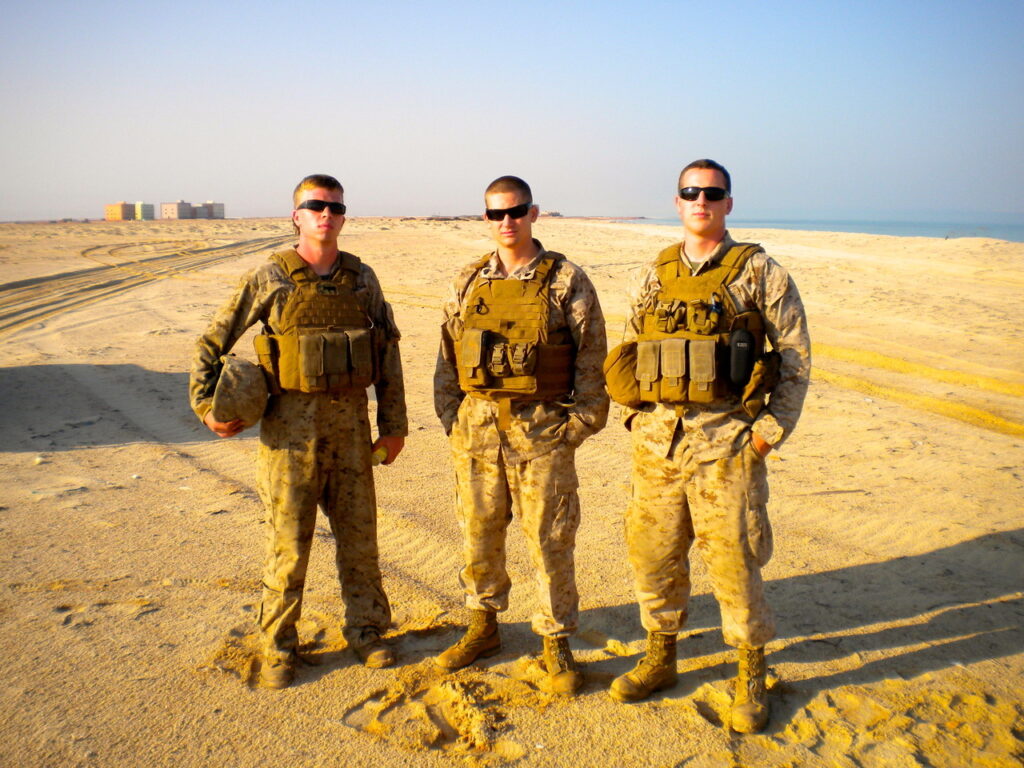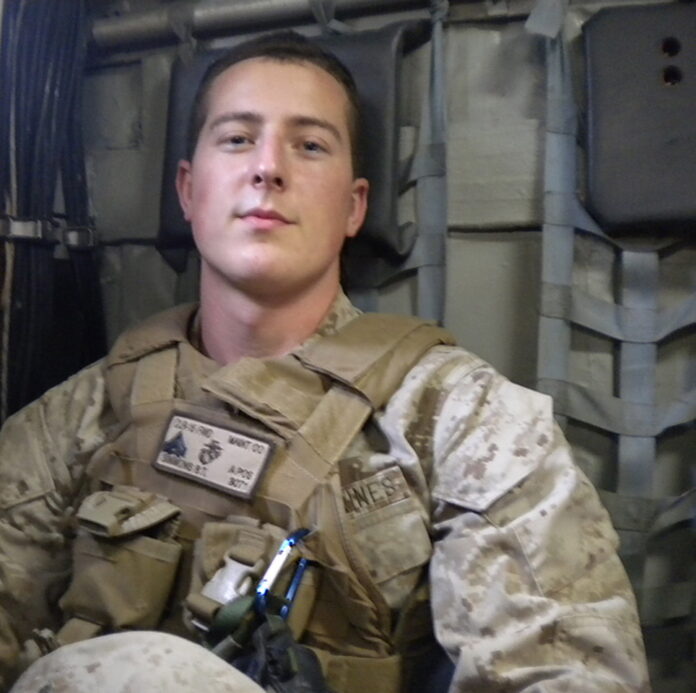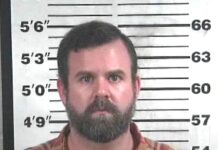CULLMAN, Ala. – On Veterans Day, the nation pauses to give thanks to those who have served in the United States Armed Forces. We honor and tell stories of their sacrifices and heroism and celebrate the freedoms their actions continue to provide. What is often overlook are the difficulties service members face once they separate from the military and the toll it can take on them and their families.
United States Marine Corps veteran Bryant Simmons is a resident of Cullman County. He and his wife live in Hanceville with their eight children (and one on the way). Simmons sat down with the Tribune to discuss the difficulties he has faced while trying to adjust to the civilian world.
Simmons served in the Marine Corps for five years with two deployments to the Middle East. He was an electrical systems technician but after separating from the Marine Corps, he returned to college. This, as it turned out, was not easy. “I primarily worked on generators, which was great because that helped me get a job when I got out,” Simmons recalled.
He said that when preparing to leave the military, there is pressure from within to stay and often the difficulties of returning to civilian life are cited as reasons for not getting out. He said, “They cite things like, ‘it’s an extremely hard place to operate in society after you’ve been operating in this society.’ It’s a different type of society. When you come out, everybody is more unstructured. Everybody is maybe a bit disrespectful in some ways. I grew up in the south, so we are pretty mannerable down here and pretty patriotic down here, so it’s better than in some instances.”
He continued, “My brother, when he got out, people would talk to him out of turn or a bit sideways. You show a certain level of respect and there is a respect factor while you’re in so when you get out, that can be a little bit of an issue. It would aggravate you a little going, ‘You have no clue who I am. You don’t know what I have or haven’t done. You don’t know anything about me.’” Generalizations made by people to young men and women can be demeaning to those coming out of military service.

Simmons recalled one instance that happened to his brother, saying, “He had an older gentleman come into his work and he made that generalization, ‘All you young people…’ It’s like, the dude’s 26 years old. He looks young, but he’s 26, 27 now, and back working at the tire store that he was working at beforehand while looking for a better job. He’s lived a little bit and been to I don’t know how many countries.”
Simmons gives this advice—“The older generation has a tendency to think ‘your generation can’t do anything good’ kinda thing. I tend to get along with my older generations but it’s like, don’t make assumptions on the younger generations as well. That can be one thing, we don’t really fit in well.”
Another thing Simmons misses is the brotherhood and camaraderie. “We actually have a small Bible study here on Tuesday. It is literally a group of veterans. We just meet up and we all have similar experiences. Everyone has been deployed. The fellowship and camaraderie are big.”
Simmons relied on blue collar jobs for several years after the military, but had some medical issues that left him needing a change of course. He leaned on his soldier benefits and returned to school. He said, “Going back to school now, I have nothing in common with my classmates other than we are in the same class together. I have more in common with the instructors but even then, there is a huge disconnect. It can be very isolating.”
Simmons is now enrolled at Samford and points out the disconnect with his classmates. He said, “Each class I’m in, everybody thinks I’m the instructor on the first day. It always happens that way. Everywhere I go, I dress differently but I look young. I act differently, apparently. That’s what they tell me. I act like an adult and that’s how they word it. ‘You act way mature and walk up to random people and start speaking to them like you have authority.’ They aren’t used to that and some of that is military. The Marine Corps will teach you to get into people’s faces if you need to. I’m not a confrontational guy, but I can be. There’s a huge difference. I think they just haven’t lived yet. They are good kids. I am not hating on them.”
He continued, “They are all afraid of appearance and reputation and what people might think of them. So they are afraid to ask the question in class even though everybody is thinking it. I’m the guy who will ask the question. I sit at the front of the class and engage with the instructor. I will meet the instructor after class because I have to. I have to work five times harder to get the same grade. I will say this, all the kids are really smart so I have to keep up with that. It’s just strange.” The problems his classmates are concerned about are very different from his. “They have little, tiny problems of not getting exactly what they wanted and I am worried about paying the mortgage.”
Simmons learned of a program designed to help former military members as they return to the classroom. The Warrior-Scholar Project is an official partner with the Department of Veteran Affairs and is a nonprofit that hosts immersive academic boot camps in partnership with some of the nation’s top colleges and universities. Simmons attended WSP’s humanities academic boot camp at the University of North Carolina- Chapel Hill this past summer and helped him to engage in the classroom where he lacked confidence.
He said, “WSP was a good avenue to join a collective that was doing the same ventures. They are all veterans and they are all trying to go to school. Some are still in and some are already out and some are retired, but we all connect on that whole military/veteran/deployment type genre of nontraditional student. You have to find things like that.”
Simmons learned of the program while attending Wallace State and applied. “They helped shape me up on my writing, they helped me think more critically and they honed in on things I was putting too much focus on that was creating disorder and chaos in my studies. I needed that. You are used to focusing on a mission and so you need to do that still. You just have to change what you are doing with it.”
Learning all the benefits available to veterans after separating can be difficult to navigate. Simmons encourages all veterans to learn as much as possible about your benefits and take advantage of them. The best thing he believes you can do is “go connect with a group of local veterans. They have been through all of it including the VA.”
Simmons also credits his renewed relationship with Jesus Christ for helping him. “I got saved in 2012. Before that, I thought I was saved—generalized, moderate Christianity. After that, I had this deep passion and focused on something new and better and more prized. You have to find something like that and I would recommend that as the ultimate thing.”
The difficulties and challenges he has faced since returning to civilian life have led Simmons to a path to becoming a counselor. He is currently working on his B.A. degree in Biblical Studies with a minor in Psychology. After completing his undergraduate degrees, he plans to transfer and earn his M.A. in Clinical Mental Health counseling. He hopes to focus on helping other military veterans.
“I think you have a specific sphere of influence in which God grants you insight into. It’s normally a group you are a part of like veterans. You have a connection point.” After speaking to a counselor at Wallace State, he said, “I did a little talk therapy and it was tremendous. It really was. It was so beneficial to work out problems with a mediator. I think it’s a good thing if done right. I think we are doing it wrong a lot but some people are doing it right.”
Copyright 2021 Humble Roots, LLC. All Rights Reserved.





















